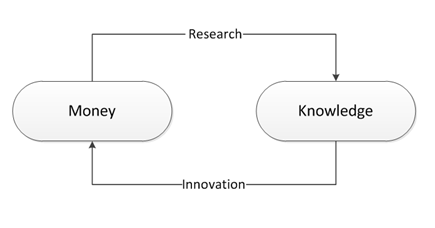March 25th, 2013
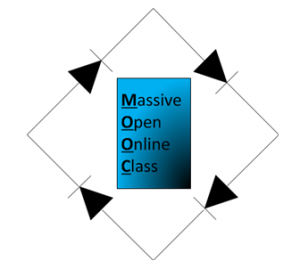 Thanks to the advent of MOOCs (massive open online courses) you can now learn with the best professors from around the world. These are free online courses that often award a certificate or statement of achievement but no college credits. Some upcoming MOOCs of interest to cognitive designers include:
Thanks to the advent of MOOCs (massive open online courses) you can now learn with the best professors from around the world. These are free online courses that often award a certificate or statement of achievement but no college credits. Some upcoming MOOCs of interest to cognitive designers include:
- Gamification
- Design – creation of artifacts in society
- A crash course on creativity- Stanford Venture Lab
Check out the list at Open Culture for other MOOCs that might complement projects (e.g. global health) you are working on.

Posted in Events | 1 Comment »
March 21st, 2013
 About a year ago I did an informal study of how university students use playlists to enhance everyday experiences and performances. This included listening to a personalized list of songs while studying, playing video games, exercising, doing something creative such as drawing or problem framing and relaxing. I surveyed or interviewed 42 students at two major universities in the US Midwest. The results were interesting and convinced me that playlist construction and use is a relevant area for cognitive designers. So I am always on the lookout for research into playlists.
About a year ago I did an informal study of how university students use playlists to enhance everyday experiences and performances. This included listening to a personalized list of songs while studying, playing video games, exercising, doing something creative such as drawing or problem framing and relaxing. I surveyed or interviewed 42 students at two major universities in the US Midwest. The results were interesting and convinced me that playlist construction and use is a relevant area for cognitive designers. So I am always on the lookout for research into playlists.
For example, Scientific American has a recent post about the role of playlist in the Psychology of Effective Workout Music. They site research that reveals:
“Music distracts people from pain and fatigue, elevates mood, increases endurance, reduces perceived effort and may even promote metabolic efficiency. When listening to music, people run farther, bike longer and swim faster than usual—often without realizing it.”
They also provide some advice on how to construct a playlist. Focus on songs you like, have a beat that makes your body want to move and that invoke a strong emotional response. No surprises here but it can take some effort to find music that puts and keeps you in the zone for exercising. Just Google ”workout playlist” if you want some examples.
I am interested to hear from readers that have examples of how playlists can enhance experience and performance.
Source for icon: Findicons.com

Posted in Service Innovation | No Comments »
March 16th, 2013
As we age, life reminds us that we are mortal. We see things die and may have near death experiences. An intensified sense of mortality has a powerful impact on our behavior in both the short and long term. Some argue (terror management theorists) that it goes much further and that most of what we do is driven by a fear of death. No matter what position you take it is hard to deny that how we embrace a sense of mortality strongly shapes major decisions, lifestyle and purpose in life. Important factors in many cognitive design problems so I am always on the lookout for scientific studies that offer insights in how the psychology of mortality is working at a practical level.
 Take for example, the recent article in the Journal of Economic Psychology on Money and the Fear of Death. The researchers conducted four experiments that suggest money can help us quell the anxiety caused by our sense or mortality. They argue this effect flows from the symbolic aspects of money and an increased sense of confidence and self-reliance that it brings. In their own words:
Take for example, the recent article in the Journal of Economic Psychology on Money and the Fear of Death. The researchers conducted four experiments that suggest money can help us quell the anxiety caused by our sense or mortality. They argue this effect flows from the symbolic aspects of money and an increased sense of confidence and self-reliance that it brings. In their own words:
“We conclude that, beyond its pragmatic utility, money possesses a strong psychological meaning that helps to buffer existential anxiety.”
If true, this means that money helps us to feel immortal.

Posted in Psychographics | No Comments »
March 12th, 2013
 I have been following the work of Mayor Michael Bloomberg to ban large sugar-sweetened drinks in New York City. He and others claim that large-sized (over 16 ounces) containers of high-sugar drinks contribute to diabetes and obesity. The proposed ban can be viewed as a public health measure.
I have been following the work of Mayor Michael Bloomberg to ban large sugar-sweetened drinks in New York City. He and others claim that large-sized (over 16 ounces) containers of high-sugar drinks contribute to diabetes and obesity. The proposed ban can be viewed as a public health measure.
From a behavior change standpoint, a ban is a hard-stop technique and often generates considerable resistance as it limits choice or liberty and challenges stakeholders that profit from the existing behavior. Indeed, this is clearly illustrated in the latest news, Judge Throws Out NYC’s Ban on Large Sugary Drinks. For example, the chief lobbyist of the NYC chapter of the National Association of Theater Owners is quoted as saying:
“You can’t force people to do things, and that’s what today’s decision shows. You can’t tell people what to drink and where to drink it,”
One alternative to a hard stop is a nudge. Rather than ban large sugary drinks you make the healthier options more appealing and naturally available. Of course, implementing a nudge requires the cooperation of just the groups that want to sell more drinks.
The judge’s ruling will be appealed so Bloomberg’s experiment in using government to curb the obesity epidemic in the US will continue. I am interested to hear from readers. Should we ban such drinks?

Posted in Behavior Change | No Comments »
March 6th, 2013
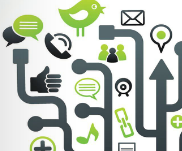 The Chief Learning Officer magazine ran a recent article on microlearning - In Learning, Size Matters. The idea is to deliver bite-sized learning experiences when needed that are fully integrated into work. The emphasis is on improving performance by learning from immediate experience. While this may remind some of learning objects, we are now in the era of posts, tweets and smart phone reminders.
The Chief Learning Officer magazine ran a recent article on microlearning - In Learning, Size Matters. The idea is to deliver bite-sized learning experiences when needed that are fully integrated into work. The emphasis is on improving performance by learning from immediate experience. While this may remind some of learning objects, we are now in the era of posts, tweets and smart phone reminders.
The article includes comments from readers, for example:
Parul Gupta: Bite-sized learning is what sticks with learners. Learners are so overloaded with content that a clear, concise and crisp bite of learning is what they cherish. I saw these bites catch fire in a leader-led development program. The small bites of learning should consist of a single topic and need to be extremely well designed.
I’ve seen that too but how do we design microlearning experiences? One way is the knowledge card model. In this approach, we take a particular performance or learning goal and break it down into a set of techniques and behaviors that need to be mastered. Each card offers a microlearning script for practicing a technique or behavior. Participants that want to improve get a small deck of cards and start their day by picking one to play. They pick a card that is sure to fit their circumstances.
For example, I recent developed 5 decks that support microlearning the competencies of innovation. One deck is focused sharpening your observation skills to deepen and broaden what you learn from experience. An example card:
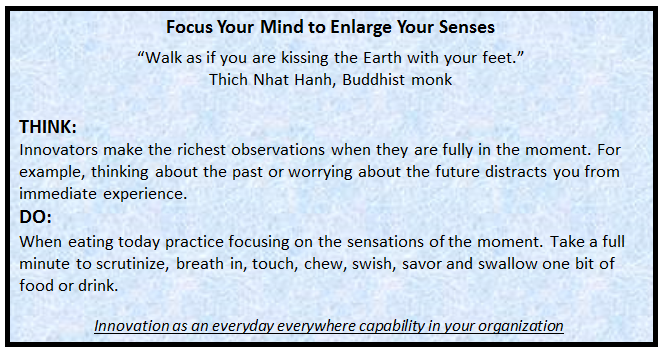
Something that takes only a few minutes and can easily be integrated into snack or meal time. This is a microlearning from experience. Imagine now 24 other such experiences designed to open all five of your senses to drive deeper learning and innovation. Micro changes that accumulate into macro effects, all designed for how our minds naturally work.
Knowledge cards are one way to design and deliver microlearning on a wide variety of topics. I am interested to hear from readers that are using different designs.

Posted in Behavior Change, Service Innovation | No Comments »
February 27th, 2013
 Many of the cognitive designers I know are working on the problem of weight and eating habits. Not that they are trying to design the perfect diet (some are) but more so, they are working to develop programs that helps us acquire and keep health eating habits despite a hectic lifestyle and easy access to unhealthy food and drink. So I am always on the lookout for scientific studies that focus on eating habits with insights for designers.
Many of the cognitive designers I know are working on the problem of weight and eating habits. Not that they are trying to design the perfect diet (some are) but more so, they are working to develop programs that helps us acquire and keep health eating habits despite a hectic lifestyle and easy access to unhealthy food and drink. So I am always on the lookout for scientific studies that focus on eating habits with insights for designers.
For example, an article in Psychology & Health examines how eaters that intentionally restrain their calories both fail to take in less calories and generate significant guilt feelings. Unfortunately, these guilt feelings can lead to more serious problems such as emotional eating. Some specifics:
Checking the food afterwards, the researchers found that the restrained eaters – those who dieted often and who fretted about their consumption – had eaten just as much as the other participants, including just as much high-calorie food. But crucially, they felt more guilty afterwards, especially in relation to their recent indulgence.
The article is available for free and provides a rich set of references many with an open access URL.
I am interested to hear from readers that our working on projects focused on changing eating habits.

Posted in Behavior Change | No Comments »
February 22nd, 2013
 The National Science Foundation (NSF) convened an international panel of experts and held a workshop to explore scientifically validated game designs that boost attention and well-being. The finding are encouraging.
The National Science Foundation (NSF) convened an international panel of experts and held a workshop to explore scientifically validated game designs that boost attention and well-being. The finding are encouraging.
They claim there is ample evidence that some types of video games enhance attention and executive control which in turn can improve self-regulation and well-being.
We also have a long-way to go before we understand how to design interactive media for specific cognitive effects. The panel cited research that showed many serious games (those designed to purposes other than education) failed to produce the desired outcomes. While at the same time some produce widespread unintended but fortunately positive effects. The panel called for more research into the cognitive impacts of specific game mechanics, a focus on social/emotional skills and individual differences as well as improved validation and commercialization methods.
The full report is worth reading for cognitive designers working on game, interactive media, self-control or well-being applications.

Posted in Behavior Change, Examples | No Comments »
February 16th, 2013
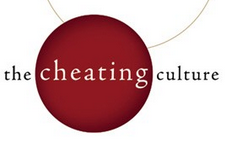 Some argue that we are awash in unethical behavior at all levels in society. For example, check out David Callahan’s, The Cheating Culture: Why More Americans are Doing Wrong to Get Ahead. Attempts to curb unethical behavior don’t appear to be doing the job. Much like our attempts to change unhealthy behaviors, we spend a lot of money and do a lot of education but are still losing ground.
Some argue that we are awash in unethical behavior at all levels in society. For example, check out David Callahan’s, The Cheating Culture: Why More Americans are Doing Wrong to Get Ahead. Attempts to curb unethical behavior don’t appear to be doing the job. Much like our attempts to change unhealthy behaviors, we spend a lot of money and do a lot of education but are still losing ground.
 Unethical behaviors are driven by the choices we make and the habits we have. To effect real change we need to understand the moral reasoning behind ethical choices and the cognitive science of how moral habits are formed. That’s why I am always on the look out for scientific studies of moral reasoning that offer actionable insights for designers. One of my favorite resources is the Morality Lab at Boston University where they study the cognitive neuroscience of moral reasoning.
Unethical behaviors are driven by the choices we make and the habits we have. To effect real change we need to understand the moral reasoning behind ethical choices and the cognitive science of how moral habits are formed. That’s why I am always on the look out for scientific studies of moral reasoning that offer actionable insights for designers. One of my favorite resources is the Morality Lab at Boston University where they study the cognitive neuroscience of moral reasoning.
Take for example, the recent finding that priming can be used to shift your view on ethics and change behavior:
“Getting people to think about morality as a matter of objective facts rather than subjective preferences may lead to improved moral behavior.”
Here is the question they used to prime for moral realism: “Do you agree that some things are just morally right or wrong, good or bad, wherever you happen to be from in the world?” Nothing more complicated than that.
The design implications of this are clear. Communications, leadership talk and other messaging that promotes moral realism (ethics are a matter of fact) might boost the effectiveness of your ethics effort. You can access a draft of the entire paper HERE and be sure to check out the lab’s other publications.
I am interested to hear from other cognitive designers that are working on ethics challenges.

Posted in Uncategorized | No Comments »
February 14th, 2013
Posted in Related Fields | No Comments »
February 10th, 2013
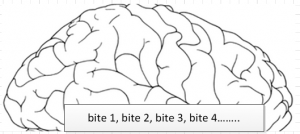 In the cognitive design blog we focus on how minds (individual, group and machine) actually work and how we can turn those insights into innovations. Take for example, food psychology. How we think-and-feel about food controls our consumption behavior and our body mass index. A PLOS research article illustrates this nicely:
In the cognitive design blog we focus on how minds (individual, group and machine) actually work and how we can turn those insights into innovations. Take for example, food psychology. How we think-and-feel about food controls our consumption behavior and our body mass index. A PLOS research article illustrates this nicely:
“Consumption with large sips led to higher food intake, as expected. Large sips, that were either fixed or chosen by subjects themselves led to underestimations of the amount consumed. This may be a risk factor for over-consumption. Reducing sip or bite sizes may successfully lower food intake, even in a distracted state.”
The effects were significant. For example, they found small bites led to 30% reduction in consumption if subjects were not distracted by watching a movie while they ate.
It appears that our minds are at some level deciding if we are full or not by counting how many bites or sips we take. Change the size of the bite or sip or interfere with our ability to count and you have a pre-programmed impact on consumption.

Posted in Behavior Change, Cognitive Bias | No Comments »
 Thanks to the advent of MOOCs (massive open online courses) you can now learn with the best professors from around the world. These are free online courses that often award a certificate or statement of achievement but no college credits. Some upcoming MOOCs of interest to cognitive designers include:
Thanks to the advent of MOOCs (massive open online courses) you can now learn with the best professors from around the world. These are free online courses that often award a certificate or statement of achievement but no college credits. Some upcoming MOOCs of interest to cognitive designers include:







